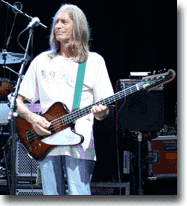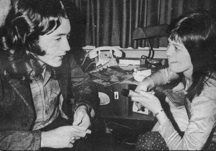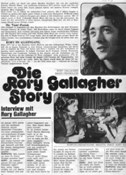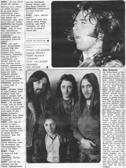May 13 2011
Rory Days: An interview with Robin Sylvester — Part 1
Robin Sylvester, bass player for Bob Weir’s band, RatDog, has been a fixture of the San Francisco music scene for so many years that one might understandably forget his substantial musical accomplishments in his own native England. In the late sixties, as the British Blues explosion rocked the pubs, clubs and concert halls of London Town, Robin was one of those lucky sods who witnessed it all, and much like his American counterparts who descended upon Yasgur’s farm in the summer of ’69, he can legitimately point to those heady times and say, “Yes, I was there!”
Born in 1950 Post War London, Robin spent much of his youth singing with the London Boy Singers, a professional boys’ choir patronized by distinguished composer Benjamin Britten. The choir performed regularly at Covent Gardens, and even made an album of Christmas music at famed Abbey Road Studios. Although now primarily known as a bass player, Robin also plays keyboard and guitar. By the time he turned 15 he was playing double bass in a Jazz band called, the David Lund Trio, and then later, the folk-rock band ORA. In 1969 he started working as chief engineer at London’s Tangerine Studios, and for the next 5 years worked closely with some of the finest up and coming Jazz, Progressive Rock, and Blues bands of Great Britain — none finer, at least in this writer’s view, than Ireland’s favorite son, Rory Gallagher.
Recently, I had a chance to ask Robin about those heady times in London where he witnessed first hand the great British Blues & Rock explosion — attending incredible shows at famed nightspots like the London Marquee, and recording aspiring musicians at Tangerine Studios. Of particular interest to me was his work with Blues and Rock guitarist extraordinaire, Rory Gallagher.
Part One … The London Marquee
Shadowplays: Hi Robin, thanks for taking time out from your busy schedule to answer a few questions about those times. Are you still playing with RatDog?
Robin Sylvester: My pleasure. My “busy schedule” is restricted at the moment, health concerns making on-the-bus travel impossible. I’m “sitting-in” a lot locally with some great bands, – mostly from the loose greater-Dead family. In fact I just heard they will release a cd of a recent night at the Filmore where I played with The David Nelson Band and also bluegrass legends Jesse McReynolds and Peter Rowan. So life continues to be exciting! RatDog seems to be fast asleep . . . but not dead!! Just last week Bob Weir mentioned something interesting . . . but I should probably not say anything. I am however involved with a project Bob is undertaking with the Marin Symphony Orchestra: he’s augmenting the orchestra with a “quartet”. Concert in May. By the way, that’s a very good concise resume .. I could never have written that myself. It takes us through about 1975, anyway!
Shadowplays: I saw recent mention of the “Fog City Geezers”? What was that about?
Robin Sylvester: Where on earth did you see that!! Last summer I played at a book launch with some friends elsewhere known as Jemimah Puddleduck. The book was a rock & roll mystery novel by Deborah Grabien, and there is an opening band in the book called The F.C.G’s. Hence we changed our name for the occasion, just as a quick joke – I had forgotten! Turned out to be really appropriate as the keyboard player got stuck in traffic and we played as a 3-piece. Still fairly loud and blues-y, though!
Shadowplays: Speaking of the Blues, let’s talk about those exciting times in London when you first started going to the Clubs, in particular the London Marquee Club, and seeing all those great bands. Did you go to the Marquee a lot? Did you go when it was in the basement of the old Academy Cinema or had it already moved to its Wardour location?
Robin Sylvester:
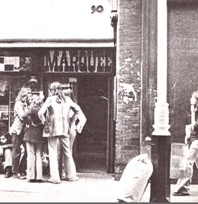
I only ever went to Wardour Street, but YES! that was the place I got my true education. It was affordable, done in time to get the last tube home and had no bar (until the 70’s) – and so was open to all ages. I would skip games afternoons to clean peoples’ houses for pocket money, hide my school blazer and head to Soho with my mate to see bands right from the charts at extremely close quarters. This included (between 65-68) The Who, Yardbirds, Cream and most of all the legendary Jimi Hendrix night.
Shadowplays: That Jimi Hendrix show was one of the defining moments of Rock! The Marquee Club seemed to have its fair share of those kind of moments. Melody Maker once described the Marquee as the “melting pot of today’s hip music, where jazz, folk, and pop meet on equal terms. Where trends are born, and stars emerge.” Such an incredible list of bands that appeared there! Looking at just one month of gigs there in March of ’65 they had: Long John Baldry and the Hoochie Coochie Men, Mike Cotton, Alex Harvey Soul Band, Manfred Mann, Moody Blues, T-Bone Walker, The Who, and The Yardbirds. They also added a recording studio in ’67 – a no-brainer considering the talent that came through the Marquee’s doors. What are your favourite memories of the Marquee?
Robin Sylvester: Well, you already got me started & now you’re encouraging me! That was the Beck Yardbirds, by the way, – opening band The Spencer Davis Group. I noticed Jeff Beck walking up to The Ship (pub on the corner) and stood watching musicians go in and out. Soon as I was old enough (maybe sooner..) I became a regular there myself. Quite convenient, half way between Trident Studios and the Marquee! The recording studio behind the Marquee really was nothing until they installed an MCI board in the 70’s. Then it was first class. Seeing Hendrix in that tiny crowded room in January ’67 was truly such a transcendental experience for me. I was privileged to be there. He didn’t even have original material yet! In late ’68 Yes (original line-up) had a Thursday night residency I went to several times. One rainy night I counted 11 people in the room! We asked them (while they were packing up their gear) why they didn’t have a record out and they said they were waiting because they wanted to sign with Atlantic!!!
Well, the Marquee was one of the main places and on a night you could see the Yardbirds supported by some other important group. I mean I saw the Spencer Davis Group there. I saw the Who there. The other clubs you could play included the Ricky-Tick, the 100 Club on Oxford Street, down in Richmond, the Tennis club the Yardbirds would play, tons of places, and lots of college gigs as well, and lots of pubs. — Rory Gallagher, 1991 interview for Goldmine Magazine
Robin Sylvester: If I looked through a book about mid-60’s bands I could make a pointless shopping-list of bands I caught here [at the Marquee] or elsewhere, notably Middle Earth/UFO/Roundhouse, the Saville Theatre and various colleges. Some more notable Marquee moments include: Muddy Waters, where drummer S.P.Leary was so drunk he fell off his stool; the night we went to see Lowell Fulsom, partly because Fleetwood Mac were billed to back him up. When we got there we found out The Mac were apparently “charging too much” and he would use The Aynsley Dunbar Retaliation instead: ok, we took a front row seat (& I use the term loosely!) in the fairly empty room and the opening band Navy Blue came out, announcing that from that night on they were calling themselves Jethro Tull, “The man who invented the seed drill”. How were they? Great! Another band whose blues roots were pure. Ian Anderson and Mick Abrahams did a couple of great acoustic blues tunes, I recall.
In the summer of ’67 I enjoyed most of the burgeoning psychedelic bands around town: Pink Floyd with Syd; Soft Machine; Tomorrow; Zoot Money’s Dantalions Chariot: Pretty Things. I even went to a couple of “Ready, Steady, Go” broadcasts in my groovy checked hipster trousers!
Long John was always around, and always had great bands. Manfred Mann, yes. Paul Jones was really friendly; we talked about R&B records one night & I went home and made a want-list of hard-to-find singles. Alex Harvey . . .Ah, Milo! The memories you are unlocking! But my Alex stories would come a little later. There was some rivalry between Geno Washington and Jimmy James & The Vagabonds. Seems silly now! Geno had a slick soul outfit, and Jimmy had a looser more Jamaican sound which I enjoyed. I’m still going to resist looking at a list!
Shadowplays: In an Adam Perry interview you mentioned that you watched the evolution of Fleetwood Mac from 3-piece to 4-piece to 5-piece. From Peter Green to Danny Kirwan? What a “long, strange trip it’s been” for them. I remember when they were called “Peter Green’s Fleetwood Mac”. He played with such incredible feeling. I like Santana’s take on Black Magic Woman, but Peter’s original version was so beautiful.
Robin Sylvester: Ah yes. A sublimely beautiful player. Played from somewhere deep inside, like our Rory. A couple of us used to go from gig to gig in London following PG’s FleetwoodMac – they played a lot. I was probably thinking of the early shows when they were technically a 4-piece, but used to do the serious stuff as a 3-piece – without Jeremy Spencer who would get up and do his Elmore James schtick every now and then. When Danny Kirwan joined (very suddenly) they became more integrated.
Shadowplays: Speaking of Rory, I remember reading that Rory was surprised when The Mac came out with the single “Albatross”. Rory was very much against “the single”. Were you involved in any of Mac’s later releases?
Robin Sylvester: Rory had his purist side! But I never heard him say anything negative about anything really. I could hear him laughing at it!! I never had a direct connection with The Mac, only individual members.
Shadowplays: Wikipedia has you down as playing with Christine McVie later on. Interesting since she started out with Chickenshack with ANDY Sylvester as band leader and bassist. No relation I guess? Did you play or work with any other FM splinter groups? For instance Bob Welch?
Robin Sylvester: Wiki has it right this time! This was around ’81 and the Mac was slowing down giving Christine time to stretch out as a producer and solo artist. We did some good stuff with singer/songwriter Robbie Patton, and got very close to doing Christine’s solo album. We had a good relationship, I thought, but things moved too slowly and there was a sort of L.A. shuffle while I was up in San Francisco by then.
Subsequently I did work some with Bob Welch, including a big show released on Laser Disc (!!) and some of which I’ve found on You Tube. One tune has all the Mac sitting in except Lindsey. I stayed on stage to cover his vocal part, and Stevie kept coming over to sing with me . . . It looks very strange!!! (Who IS this guy??)!!
No relation to Andy, nor the guy in the Hollies.
Shadowplays: Was this Bob Welch and Friends, Live at the Roxy 1981? I’ve seen videos of the concert on youtube.
Robin Sylvester: Yes, that was it. I played bass the whole show except for “Hypnotized” when McVie jumped up and took over. At that point I grabbed a shaker and became a mysterious singer again! I’m pretty well hidden, mind you. It was a great time, but really belongs to a different era from the one we’re focusing on.
Shadowplays: Well, let’s get back to the 60’s then. By the late 60’s Rory Gallagher was getting some attention with his band Taste. In a New Musical Express interview, John Lennon called Rory Galllagher and Taste: an especially “bright spot” in an otherwise dull year. The original Taste with Eric Kitteringham and Norman Damery played the Marquee on several occasions in early ’68 and then the new Taste with Wilson and McCracken did their first few shows there late that summer after signing with Polydor. Was it at the Marquee you first saw Rory Gallagher play, or somewhere else? What kind of impression did he make?
Robin Sylvester: A high-school band I was sitting in with opened for Taste at The Country Club, Belsize Park in mid-’68. Rory blew me away, but not the rhythm section. Years later he astounded me by remembering tunes from our setlist on that night!!
Shadowplays: The owner of the Marquee, Harry Pendleton, also organized the Reading Festivals, using it, among other things, as a way to promote the bands that had a residency at the Marquee. Taste played the Reading Festivals in ’68 and ’70, and the Rory Gallagher Band played it in ’71, ’73, ’76, and ’80. Did you ever go to the Reading Festival or other large festivals like the Isle of Wight that were popular back then?
Robin Sylvester: No. Sadly, once I started engineering in ’69 I just didn’t have that kind of time off for about 5 years. Sessions always over-ran, and I remember many late night dashes to try and catch the end of somebody’s set (and last call!). These were often bands I was working with, whose gigs were in strange remote places. I was getting my music mostly from records and, of course, daily huge doses in the studio.
I did make some of the larger London events, like The Technicolor Dream at Alexandra Palace, and Christmas On Earth at Olympia. Nobody was at their best at those, and the sound was terrible, except for Jimi [Hendrix] who didn’t need no stinkin’ fancy PA!! The Roundhouse Saturdays were all-night events which would end before the first tube. There was always an interesting crowd gathered waiting outside Chalk Farm station, or you could walk up to Primrose Hill and watch the dawn. I actually saw Donovan there once doing the same thing!
Shadowplays: You were also playing in bands by this time, the first being the David Lund Trio? Is this the jazz pianist, David Lund? He recently died of Parkinson’s Disease. In an article I read after his passing it mentioned that in his youth he would listen in bed to jazz on the American Services Radio. I remember reading that Rory Gallagher too would listen to American Services Radio in order to listen to Blues. This seemed one of the few ways to listen to American Blues & Jazz in those days.
Robin Sylvester: If you saved up 32-and-6 pence you could go to Dobell’s on Charing Cross Rd and listen to all kinds of records all day, then buy the most interesting one to take home. They had folk, jazz and blues in abundance. There was also a street market in Soho with barrows-full of great records.
Sorry to hear of Dave Lund’s death; I had heard he was very sick. He was my English Lit teacher when I was about 13, straight down from Cambridge, very hip, and the first person I ever heard who could play in an Oscar Peterson style. He drafted our band’s drummer, Julian Diggle (oh, do google the old jazz-monk!) and myself on the eminently unplayable school double-bass. We were a feature every year at the end-of-school concert, and by the time I left school we were actually making appearances locally at such as the Hampstead Everyman.
Thanks for the link [to the David Lund article]. I was fascinated to read that he was well known for what he started with our trio. He used to invite famous musicians like Humphrey Lyttleton to the school to talk and play a few tunes with us, and he took us to see/meet Dudley Moore one day, playing with HIS great trio. I have my final report where he wishes me good luck in my musical career! I see he still lived on Frognal after all these years . . . that is just a few steps from the school where he taught. Even the church-yard in which they buried him is just over the back garden wall! A great man; he must have inspired many more generations of kids after me.
Shadowplays: After the David Lund Trio you played along with several other University College students in a band called Ora. How would you describe their sound? Folk-Rock? I’ve listened to the reissue of their one album that included some bonus tracks. Were you involved in the re-issue? I thought Whitch was a strong tune. Did it get some airplay? Some of the tunes are up on Youtube.
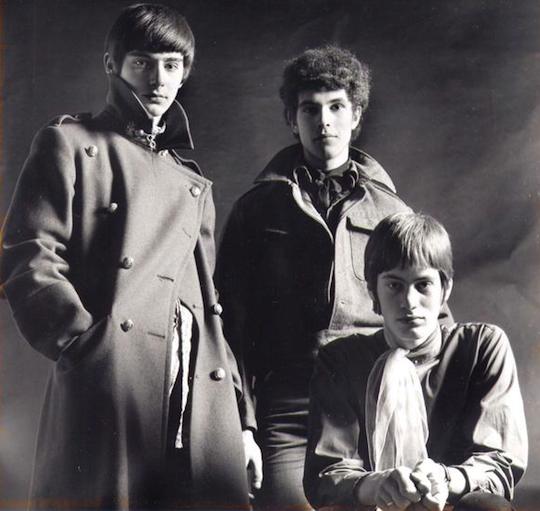
Ora band members James Rubinstein, Julian Diggle, and Robin Sylvester
Robin Sylvester: We were a 3-piece, loud Hendrix/Cream-style high-school band, in which I played guitar, until James (Rubinstein) started writing prolifically – so I switched to bass and the sound became softer. On the tune you mention and maybe a couple more, we added my room-mate of the time on lead guitar to mix it up a bit.
The re-issue was made by James from his hoard of old tapes. Most extras were from Tangerine experiments, late at night or on infrequent days off. I really had nothing to do with the compilation. Amazing to hear my early endeavours at the board!
Shadowplays: ORA evolved into Byzantium which had a much larger following. Was it a similar sound? Were you playing bass for them or had you by this time moved to the engineering/production side of the equation?
Robin Sylvester: Byzantium was another group of friends from school who performed intricate arrangements of James’s tunes (but without him, – at least at first). When they added Chaz Jankel (Blockheads) they became professional, signing with Gaff Management & securing a deal with A&M (UK) and Warner Bros (US). I had produced the demo tapes on a day off, and hence found myself suddenly co-producing a band with a real budget.
Shadowplays: You got into the technical side of record production, purely accidental? Can you explain the circumstances. What was the name of the band that you first filled in as engineer for?
Robin Sylvester: The owner of the record company that recorded Ora decided to build a studio, with no actual knowledge on the subject, in one corner of his bingo-hall in Dalston (N.E. London). I was hanging around from the start (spring of 69), watching the engineer they hired, & experimenting by myself or with friends in the middle of the night. One day early on, Jonathan King had booked the studio to try it out and to record a Serge Gainsberg tune with a handful of session-men, and when it became clear the engineer was not going to turn up, I stuck my neck out and confidently said I could handle it. And so I did. Mr King was very patient with what I’m sure was an inferior session for him; but I was hooked! The next day I was chief engineer and fielding “trial” sessions for all kinds of people, some of which went very well.
Shadowplays: Very well, indeed! You got to work with some incredibly talented people. Let’s talk about your time as chief engineer at Tangerine Studios.
End of Part One
This ends Part One of the Interview. In Part Two, Robin talks about his time as chief engineer for Tangerine Studios and in particular, his work with Rory Gallagher
